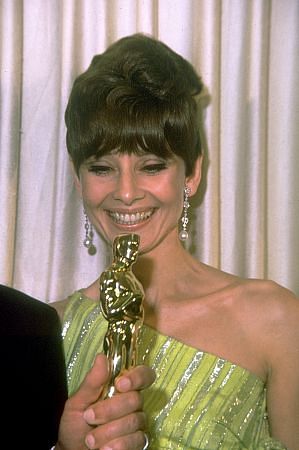|
Audrey Hepburn
Scroll down for movie list.
Biography from Leonard Maltin's Movie Encyclopedia:
When thinking of this dark, almost luminously beautiful actress, especially as a young woman, the words "waiflike" and "gamine" frequently spring to mind. It's true that Hepburn's large, hypnotic eyes, slender figure, and distinctive voice marked her as a true original in an era when Marilyn Monroe was everyone's favorite pinup, but physical attributes don't explain her appeal. Winsome, delicate almost to fragility, she brought to her performances an effortless charm perhaps best described as ethereal. A former ballet dancer, Hepburn broke into movies in 1948, playing bits in several European and English productions, most notably a walk-on in the opening scene of The Lavender Hill Mob (1951). In 1953, she came to Hollywood to star as the princess on the run in Roman Holiday she subsequently won an Oscar for the role, confirming her newfound stardom.
Hepburn opted to work at a leisurely pace, seeking a variety of roles; these include a chauffeur's daughter in Sabrina (1954, which brought her another Oscar nomination), Natasha in War and Peace (1956), a Greenwich Village intellectual in Funny Face (1957, in which she sang and danced with Fred Astaire), a Parisian romantic in Love in the Afternoon (also 1957), a South American "bird woman" in Green Mansions (1959, one of her best remembered-if least successful films), the lead role in The Nun's Story (1959, another Academy Award nomination), a half-Indian in The Unforgiven (1960), the blithe Holly Golightly in Breakfast at Tiffany's (1961, which snagged her yet another Oscar nod), a newly widowed target in Charade (1963), Eliza Doolittle in My Fair Lady (1964), a bickering wife in the delicious Two for the Road (1967). It was she who asked Henry Mancini to compose the (memorable) score for that movie, as he had for several of her best films; it was also she who fought to keep "Moon River" from being cut from Breakfast at Tiffany's She introduced that Oscarwinning Mancini-Johnny Mercer song in the film, in her own pleasing voice, but when she starred in My Fair Lady it was decided that she had to be dubbed!
Hepburn earned her final Oscar nomination playing a terrorized blind woman in Wait Until Dark (1967), which was produced by her longtime husband Mel Ferrer (who also acted with her in War and Peace and directed her in Green Mansions). Soon after, she divorced him, and began to devote herself to a variety of causes, notably world hunger. She became a tireless supporter of UNICEF and traveled the world raising funds and calling attention to the plight of needy children. More or less retired, she was lured back to the camera occasionally-as an aging Maid Marian opposite Sean Connery in Robin and Marian (1976), another damsel in distress in Bloodline (1979), an elegant jewel thief in the made-for-TV Love Among Thieves (1987), or as an angel in Always (1989)-but seemed content to stay busy with more important things than movies. She appeared with her son Sean Ferrer in Peter Bogdanovich's They All Laughed (1981). Just months after her death, he appeared on stage to accept her posthumous Jean Hersholt Humanitarian Award at the 1993 Oscar ceremony. |  |










